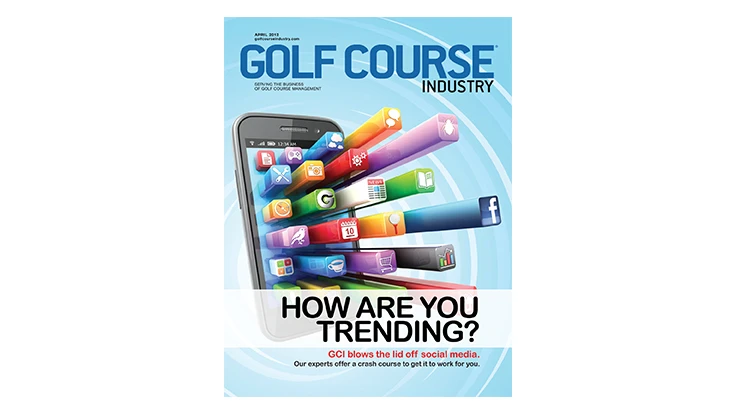
 You roll over in the wee hours of the morning and clear the sleep from your mind. Your greens aerification project, the latest complaint from your club manager and your 10-year-old’s note from the teacher pop into your head all at once. Then you roll over and check your smart phone at your bedside for Tweets.
You roll over in the wee hours of the morning and clear the sleep from your mind. Your greens aerification project, the latest complaint from your club manager and your 10-year-old’s note from the teacher pop into your head all at once. Then you roll over and check your smart phone at your bedside for Tweets.
Are you a social media addict? Hard to say. First of all, you need to define the term. According to David J. Linden in “The Compass of Pleasure: How Our Brains Make Fatty Foods, Orgasm, Exercise, Marijuana, Generosity, Vodka, Learning And Gambling Feel So Good,” addiction can be defined as “persistent, compulsive use in the face of increasingly negative life consequences.”
Linden also cautions that addiction can become a consequence when “liking” becomes “wanting.” The more an addict wants something, the less he or she actually likes it, with more and more of the addictive substance required to recapture pleasure that is never quite attained. Our brains can actually become “rewired” so that our pleasure circuit responses are permanently changed.
Every time we receive an email, Tweet or the Facebook notification ding, we get a little jolt of dopamine, the chemical in our brain that stimulates the pleasure circuit. So we keep checking our phones, tablets and computers in hopes of getting that jolt.
“I’ve seen others so addicted that it’s painful to watch,” says Dustin Riley, superintendent at Oconomowoc Golf Club, Oconomowoc, Wisc. “I had the opportunity to witness a colleague uncontrollably check his cell phone (with a dead battery) every three or four minutes over the span of two hours, all the while forgetting each time his phone was dead. He was afraid to miss something.” What he was probably missing was that dopamine jolt.
 When used properly, social media can be a valuable communication tool. “I use Gmail, Yahoo Mail, text messaging and LinkedIn,” notes Bill Prest, head golf course superintendent at Sweetbriar Golf Club in Avon Lake, Ohio. “Times are changing and social media is part of life now, like it or not. I believe that if you want to stay current in the world you’d better embrace it, or you will fall out of touch.”
When used properly, social media can be a valuable communication tool. “I use Gmail, Yahoo Mail, text messaging and LinkedIn,” notes Bill Prest, head golf course superintendent at Sweetbriar Golf Club in Avon Lake, Ohio. “Times are changing and social media is part of life now, like it or not. I believe that if you want to stay current in the world you’d better embrace it, or you will fall out of touch.”
Keeping in touch is exactly what drives Brian Burke, superintendent at Sycamore Creek Country Club in Springboro, Ohio. This is Burke’s first year on Twitter, which is the only social media he uses. “I have about 50 people following me, mostly club members. I follow about 100 people myself; almost all are industry-related.”
Burke appreciates the brevity required by Twitter. “I tend to get wordy, and with only 140 characters I can give folks the information they need and move on.”
On the other hand, David Phipps, superintendent at Stone Creek Golf Club in Oregon City, Ore. confesses, “I’m afraid I use a little bit of everything. I like to use them in concert with one another, depending on what target audience I am trying to reach.” Starting on Facebook looking for an old friend in Finland (who he never found), “friends were coming out from everywhere.”
Phipps began writing a blog in 2009 (http://stonecreeksuper.blogspot.com), which offers club news, golf course environmental information, gorgeous photography and even a bit of humor. The blog now gets more than 3,000 pageviews each week and has been a promotional tool. “We have had people make it a point to stop by Stone Creek from the airport on the way through town to play Bandon Dunes on the southern coast just because they have followed the blog.” He promotes the blog with Twitterfeed.
Phipps admits that social media is easy to get caught up in.
“I’ve found it’s best to turn off all the notifications on my Droid,” he says. “It is so tempting to look, but there is always time to check back later. Nothing bothers me more than seeing people sitting around a table with their noses in their phones.”
Employees are not immune to the temptations of social media, and it is useful to have a policy regarding its use. “A colleague of mine got into a bind with an employee posting on Facebook,” says Mark Semm, director of agronomy at The Clubs of Cordillera Ranch in Boerne, Texas. “Even though the employee made some really negative posts, it was a corporate golf course and they couldn’t let him go because it wasn’t in the policies and procedures.” The employee handbook at Cordillera Ranch now has a supplement outlining the use of social media by employees.
|
FAD or FAD? While the current edition of the Diagnostic and Statistical Manual of Mental Disorders might not have an entry for Facebook Addiction Disorder (FAD), few would argue that social media can become a problematic time sucker for some people. But can you get addicted? Some estimates say that nearly half of Facebook’s membership (roughly 350 million people) log on at least once a day. Think you might have a social media problem? All Facebook (www.allfacebook.com), an unofficial Facebook resource, offers up this tongue-in-cheek quiz. Answer “Yes” to one of the following and your status updates are symptomatic of FAD, and not just a fad.
|
Semm himself is sold on the value of technology. “I mainly use Facebook and Twitter to communicate with our membership. It’s great that they are integrated so well with my iPhone, so it’s fast and easy to get the word out about course conditions, tournament preparation and other information the members need,” he explains.
Semm succumbs to the temptations of social media occasionally. “There are times I could be doing something more productive, but before you know it you’re sitting on the couch clicking links on Facebook and two hours are gone.” He limits his “recreational” use to his home; never on the job.
Interfering with work is one way that social media addiction can manifest itself. If you or your employees are less productive, either because you are engaged on your smart phone at work or you are tired because you were up until 1 a.m. Tweeting, it might be time to re-evaluate your use.
If others comment on your constant use, and you find yourself resentful of these comments, that’s another sign. Likewise if you can’t resist checking on updates when you are a having a face-to-face conversation with a friend or colleague.
Feeling guilty about how much time is spent Facebooking, trying to cut back on Tweet time, or trying to set limits (i.e. forcing yourself to only check in during breaks and being unable to resist) are all warning signs.
Unlike physically addictive drugs such as alcohol, tobacco or methamphetamines, social media addiction can usually be managed as long as you are aware of it. David J. Linden notes that almost all video game addicts recover without intervention.
Setting limits and sticking to them, paring down the number of networks you belong to, scheduling specific times to network and simply turning off the smart phone for a few hours each day are all recommended ways to “beat the addiction.”
Social media can be a great communication avenue when used properly. But like all good things, moderation is the key to a balanced, productive online life.
|
Path to addiction
|
Helen M. Stone is a freelance writer and owner of Las Vegas-based Stone Peak Services, and a frequent GCI contributor.
Get curated news on YOUR industry.
Enter your email to receive our newsletters.
Explore the April 2012 Issue
Check out more from this issue and find your next story to read.
Latest from Golf Course Industry
- Advanced Turf Solutions’ Scott Lund expands role
- South Carolina’s Tidewater Golf Club completes renovation project
- SePRO to host webinar on plant growth regulators
- Turfco introduces riding applicator
- From the publisher’s pen: The golf guilt trip
- Bob Farren lands Carolinas GCSA highest honor
- Architect Brian Curley breaks ground on new First Tee venue
- Turfco unveils new fairway topdresser and material handler






